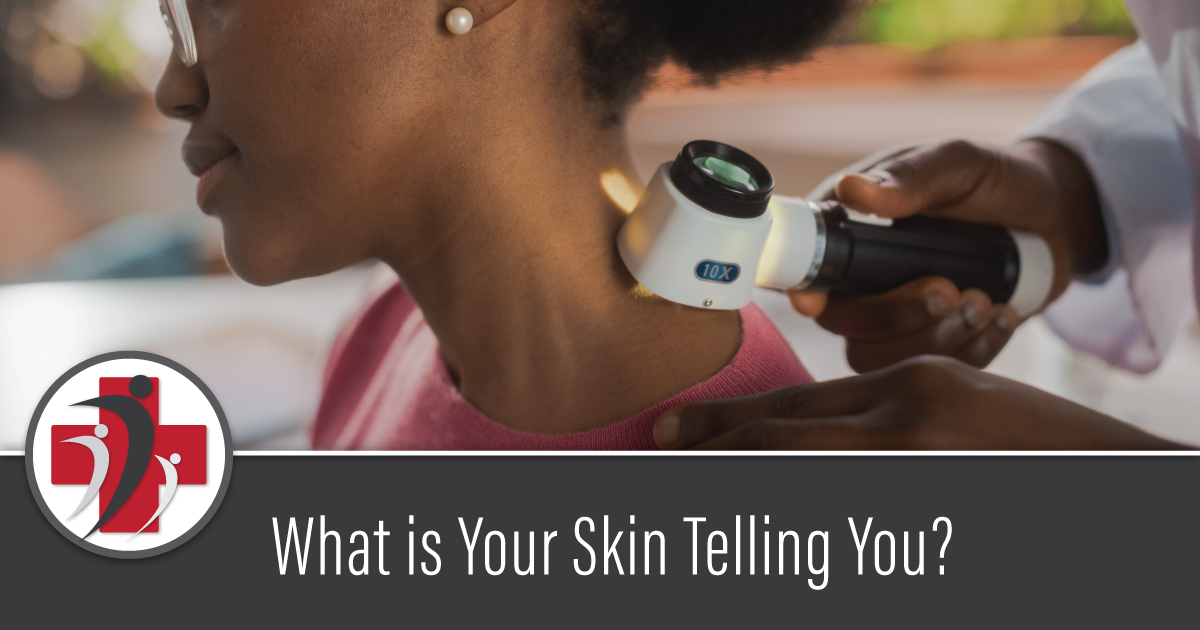What is Your Skin Telling You?

Your skin is amazing! Aside from protecting your body from germs, helping protect you from harmful UVA rays, and producing vitamin D, your skin may be saving your life. As your body’s largest organ, your skin can serve as a surprisingly reliable barometer for your overall health. Your doctor or dermatologist will be able to read any warning signs in your skin for various health conditions, as well as determine your skin to be in good health.
In observance of National Healthy Skin Month, we want to highlight just a few of the ways your skin may be trying to tell you something:
An abnormal hue
Different shades or hues of skin can point to different medical conditions. For example, skin with an orange or yellow tinge could point to liver or kidney issues. Bluish or purple skin could indicate poor circulation. Healthy skin will often have a uniform color and texture and will feel smooth.Brown spots
While most brown spots on the skin are harmless, some brown spots, especially on the legs, could indicate chronic venous insufficiency. This is a vein disorder that is caused by weak valves leading to poor blood circulation.Redness and rashes
Rashes or reddened areas that do not go away could indicate allergies, eczema, or even an autoimmune condition. Allergies will often show up as itchy or swollen areas such as hives. Autoimmune disorders will sometimes cause skin to lose pigment in some areas, or appear scaly, or thick and shiny.Unusual moles
If you notice a change in appearance of existing moles or spots, or if you develop new moles, your doctor will want to exam the area. They’ll likely check to see if the mole has irregular edges, multiple colors, asymmetry, or if it’s larger than a pencil eraser. Always report any of these symptoms to your doctor or dermatologist right away.Breakouts
Although often thought of as an adolescent condition, adult acne is fairly common. What could make doctors concerned, however, are cases of new or newly severe acne in women. This could signal a significant fluctuation or imbalance in hormones that your doctor may want to know about. In some cases, this hormone imbalance could be caused by a serious condition such as polycystic ovary syndrome (PCOS). In other cases, adult acne could be brought on by food sensitivities. Always let your doctor know of any sudden onset of severe acne.Irritated hands
There’s an autoimmune disorder that can mimic the reddened and dry condition caused by excessive handwashing. Dermatomyositis can present itself with red patches on the back of the hands that don’t go away with moisturizing. This disease is similar to lupus and can be diagnosed by a dermatologist.With any new or concerning skin issue, you should always consult your doctor or dermatologist. Too often, when people don’t heed the warning signs or symptoms their body provides, the condition ends up getting much worse and needing more intensive treatment. At the El Mirage Emergency Room, we’re here for any urgent health need, including skin emergencies in El Mirage or other parts of Arizona.
Related Posts

Deep Breaths: The Ins and Outs of Meditation and Breathwork
Breathing feels fairly straightforward, so much so that the term “as easy as breathing” is…

Resolution into Habit: How to make it stick.
As the New Year begins to settle in, many people have started to invest time…

New Year’s Resolutions
As the holiday season winds down and the post-Christmas haze begins to fade, a new…
